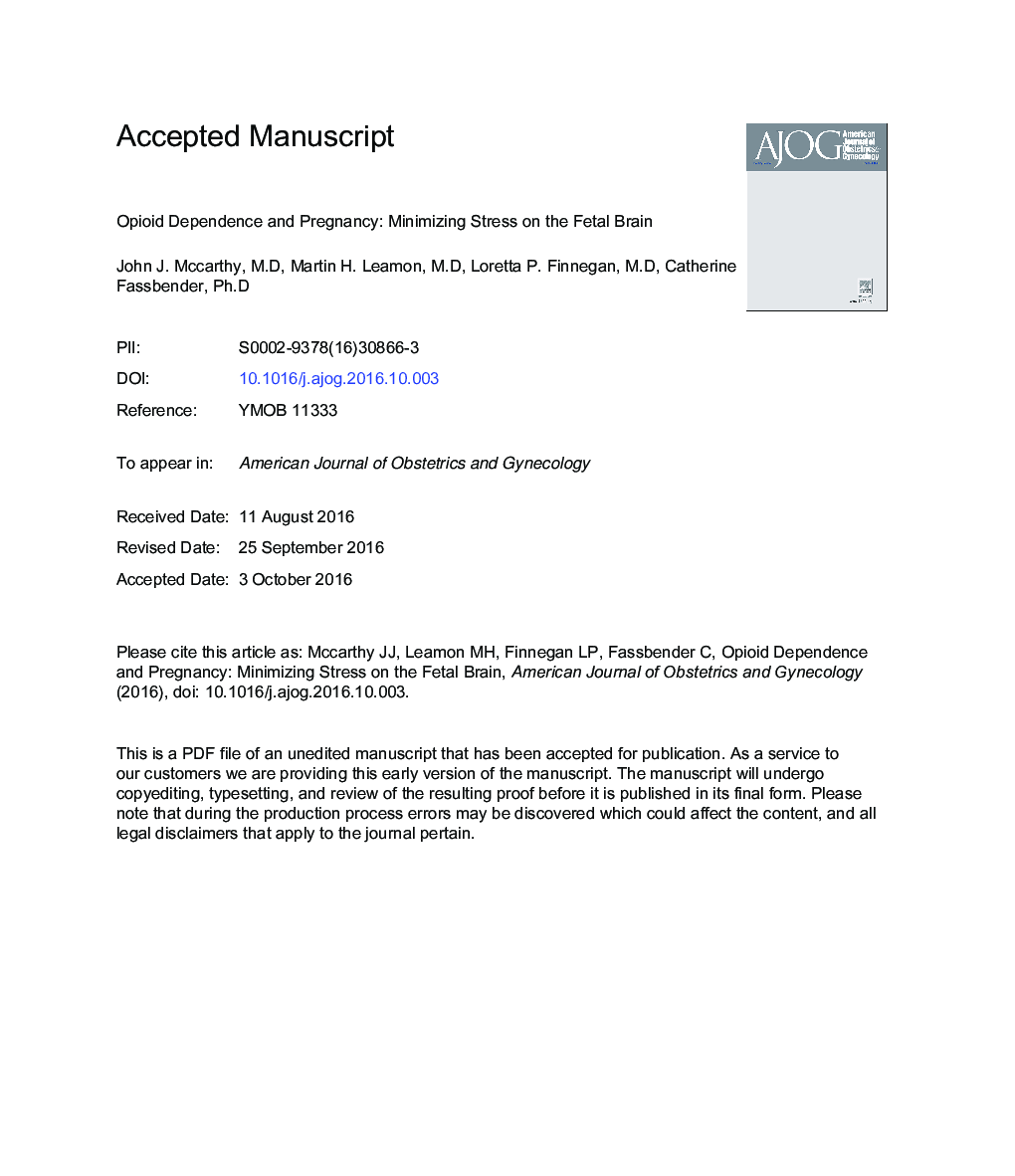| کد مقاله | کد نشریه | سال انتشار | مقاله انگلیسی | نسخه تمام متن |
|---|---|---|---|---|
| 5676234 | 1594878 | 2017 | 25 صفحه PDF | دانلود رایگان |
عنوان انگلیسی مقاله ISI
Opioid dependence and pregnancy: minimizing stress on the fetal brain
ترجمه فارسی عنوان
وابستگی به اپیوئید و بارداری: به حداقل رساندن استرس بر مغز جنین
دانلود مقاله + سفارش ترجمه
دانلود مقاله ISI انگلیسی
رایگان برای ایرانیان
کلمات کلیدی
بوپرنورفین، برنامه ریزی استرس جنین متادون، سندرم محرومیت نوزادان، وابستگی به مواد مخدر، فارماکوکینتیک، بارداری،
ترجمه چکیده
افزایش تعداد زنان حامله وابسته به مواد مخدر که نوزادان را در معرض خطر سندرم رهایی نوزادان قرار می دهد، دفتر مطبوعاتی ایالات متحده را تأیید کرد که در زمینه تحقیق و ارائه اطلاعات دربارۀ مراقبت از واحد مادر / جنین و نوزاد، مستند سازی شده است. 3 منبع عمومی وابستگی وجود دارد: اختلال مصرف مواد مخدر بدون درمان، مدیریت درد و درمان با متادون با متابولیسم یا بوپرنورفین. بررسی میزان تجربیات بیماران متادون در هنگام بارداری و وابستگی به مواد مخدر پزشک، باعث سردرگمی پزشکان در مورد مراقبت مناسب، تعامل مکرر منفی با مادر و عدم ارائه ارجاع مناسب شد. هنگامی که پزشک از حاملگی مطلع شد، بیماران در درمان درد بدون ارجاع تخلیه شدند. متادون و بوپرنورفین اغلب به دلیل منفی بودن آنها دیده می شود؛ سندرم سقط جنین نوزادان اکثر مادرانی که مورد بررسی قرار گرفتند، باید خودشان را به درمان های مخدر کمک کنند. چگونه وابستگی به صورت پزشکی مدیریت می شود، تعیین کننده حیاتی سطح استرس بر روی مادر و جنین است و بنابراین تعیین کننده دیگر سلامت نوزادان است. بررسی اثرات استرس برداشته شده از مواد مخدر و استرس عاطفی مادر بر نتایج نوزادان و نوزادان بررسی شده است. در حال حاضر تلاش شده است تا وابستگی به مواد مخدر مادران را به جرم قاچاق مواد مخدر و زنان باردار تحریم کند. این عمل هر دو خطرات حاد هیپوکسی جنین و خطرات دراز مدت برنامه نویسی اپیزیونیک ناشی از کای تی کولامین و کورتیکواستروئید را در هنگام خروج نشان می دهد. مطالعات معاصر اثرات استرس برداشتن بر رشد مغز جنین برای تشریح و ارزیابی خطرات چنین شیوع ضروری است. در هنگام تولد، عدم انطباق در مدیریت بیمارستان نوزادانی که در معرض خطر ابتلا به سندرم اختلال در نوزادان قرار دارند مشاهده شده است. نادیده گرفتن نقش حیاتی آرامش مادر در مدیریت سندرم اختلال در نوزادان، یک علت یاتروژنی و قابل پیشگیری از پیامدهای ضعیف و بستری طولانی است. اتاق نشیمن اجازه می دهد تا مراقبت مستمر از دلبستگی نوزاد و مادر / نوزاد، که اغلب ناخواسته با محیط بخش مراقبت های ویژه نوزادان اختلال ایجاد می کند، اجازه می دهد. توصیه هایی برای تحقیقات بیشتر در مورد تعاملات پزشک / بیمار و به دوز مطلوب متادون و بوپرنورفین برای به حداقل رساندن دفع مادر / جنین انجام شده است.
موضوعات مرتبط
علوم پزشکی و سلامت
پزشکی و دندانپزشکی
پزشکی و دندانپزشکی (عمومی)
چکیده انگلیسی
Increase in the number of opioid-dependent pregnant women delivering babies at risk for neonatal abstinence syndrome prompted a US Government Accountability Office report documenting deficits in research and provider knowledge about care of the maternal/fetal unit and the neonate. There are 3 general sources of dependence: untreated opioid use disorder, pain management, and medication-assisted treatment with methadone or buprenorphine. A survey of methadone patients' experiences when telling a physician of their pregnancy and opioid dependence demonstrated physician confusion about proper care, frequent negative interactions with the mother, and failures to provide appropriate referral. Patients in pain management were discharged without referral when the physician was told of the pregnancy. Methadone and buprenorphine were frequently seen negatively because they “caused” neonatal abstinence syndrome. Most mothers surveyed had to find opioid treatment on their own. How dependence is managed medically is a critical determinant of the level of stress on both mother and fetus, and therefore another determinant of neonatal health. The effects of both opioid withdrawal stress and maternal emotional stress on neonatal and developmental outcomes are reviewed. Currently, there have been efforts to criminalize maternal opioid dependence and to encourage or coerce pregnant women to undergo withdrawal. This practice poses both acute risks of fetal hypoxia and long-term risks of adverse epigenetic programming related to catecholamine and corticosteroid surges during withdrawal. Contemporary studies of the effects of withdrawal stress on the developing fetal brain are urgently needed to elucidate and quantify the risks of such practices. At birth, inconsistencies in the hospital management of neonates at risk for neonatal abstinence syndrome have been observed. Neglect of the critical role of maternal comforting in neonatal abstinence syndrome management is an iatrogenic and preventable cause of poor outcomes and long hospitalizations. Rooming-in allows for continuous care of the baby and maternal/neonatal attachment, often unwittingly disrupted by the neonatal intensive care unit environment. Recommendations are made for further research into physician/patient interactions and into optimal dosing of methadone and buprenorphine to minimize maternal/fetal withdrawal.
ناشر
Database: Elsevier - ScienceDirect (ساینس دایرکت)
Journal: American Journal of Obstetrics and Gynecology - Volume 216, Issue 3, March 2017, Pages 226-231
Journal: American Journal of Obstetrics and Gynecology - Volume 216, Issue 3, March 2017, Pages 226-231
نویسندگان
John J. MD, Martin H. MD, Loretta P. MD, Catherine PhD,
